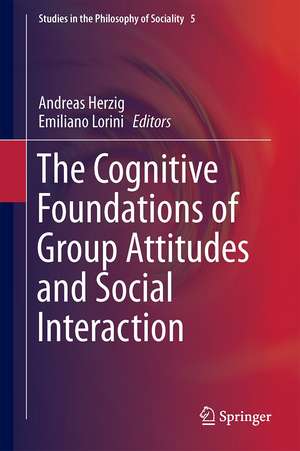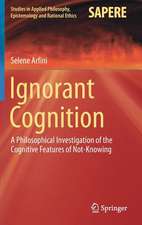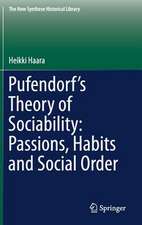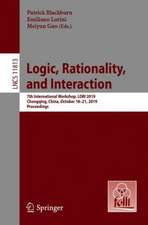The Cognitive Foundations of Group Attitudes and Social Interaction: Studies in the Philosophy of Sociality, cartea 5
Editat de Andreas Herzig, Emiliano Lorinien Limba Engleză Hardback – 19 oct 2015
This volume delves into the links between individual attitudes (such as beliefs, goals and intentions) and how they are reflected in shared attitudes where common belief, collective acceptance, joint intentions, and group preferences come into play. It pursues answers to the connections between trust and beliefs, goals and intentions and attempts to investigate questions such as: does trust have an affective component and how it may relate to hope and fear? The volume also scrutinizes game theory and questions whether it can satisfactorily explain and model social interaction and if there may be any concepts which are not addressed by the current theory.
Contributors are derived from disciplines including philosophy, economics, psychology, logic and computer science. Interdisciplinary in scope and comprehensive detail, this volume integrates a variety of approaches – philosophical, psychological and artificial intelligence – to strategic, normative and emotional aspects of social interaction.
| Toate formatele și edițiile | Preț | Express |
|---|---|---|
| Paperback (1) | 383.33 lei 6-8 săpt. | |
| Springer International Publishing – 23 aug 2016 | 383.33 lei 6-8 săpt. | |
| Hardback (1) | 390.63 lei 6-8 săpt. | |
| Springer International Publishing – 19 oct 2015 | 390.63 lei 6-8 săpt. |
Preț: 390.63 lei
Nou
Puncte Express: 586
Preț estimativ în valută:
74.76€ • 77.76$ • 61.72£
74.76€ • 77.76$ • 61.72£
Carte tipărită la comandă
Livrare economică 15-29 aprilie
Preluare comenzi: 021 569.72.76
Specificații
ISBN-13: 9783319217314
ISBN-10: 3319217313
Pagini: 250
Ilustrații: VII, 202 p.
Dimensiuni: 155 x 235 x 17 mm
Greutate: 0.48 kg
Ediția:1st ed. 2015
Editura: Springer International Publishing
Colecția Springer
Seria Studies in the Philosophy of Sociality
Locul publicării:Cham, Switzerland
ISBN-10: 3319217313
Pagini: 250
Ilustrații: VII, 202 p.
Dimensiuni: 155 x 235 x 17 mm
Greutate: 0.48 kg
Ediția:1st ed. 2015
Editura: Springer International Publishing
Colecția Springer
Seria Studies in the Philosophy of Sociality
Locul publicării:Cham, Switzerland
Public țintă
ResearchCuprins
Chapter 1 "On the philosophy and logic of help" Emanuele Bottazzi and Nicolas Troquard (Lab of Applied Ontology, ISTC-CNR, Trento, Italy).- Chapter 2 "Healing social sciences’ psycho-phobia – Founding social action and structure on mental representations" Cristiano Castelfranchi (ISTC-CNR, Rome).- Chapter 3 "Analytical decomposition of trust in terms of mental and social attitudes" Robert Demolombe (IRIT, Toulouse).- Chapter 4 "On modal logics of group belief" Benoit Gaudou, Andreas Herzig, Dominique Longin and Emiliano Lorini (IRIT, Toulouse).- Chapter 5 "Logic of promotion and demotion" Patrick Girard (The University of Auckland, NZ).- Chapter 6 "On the attitude of trust – a formal characterization of trust, distrust, and associated notions" Andrew I.J. Jones (Dept. of Informatics, King’s College, London).- Chapter 7 "The topology of common belief" David Pearce and Levan Uridia (Universidad Politécnica de Madrid; TSU Razmadze Mathematical Institute, Georgia).- Chapter 8 "Social emotions from the perspective of the computational belief-desire theory of emotion" Rainer Reisenzein (Dept. of Psychology, University of Greifswald).- Chapter 9 "Reasoning with Normative Systems" Giovanni Sartor (Dept. of Law, Eur. University Institute, Florence and Faculty of Law, Bologna).- Chapter 10 "An agent based model of Camorra: comparing punishment and norm-based policies in contrasting illegal activities".- Chapter 11 Barbara Sonzogni, Federico Cecconi, Giulia Andrighetti, Rosaria Conte(Dept. of Communication and Social Research at Sapienza University, Rome; Lab. of Agent-Based Simulation, ISTC-CNR, Rome; Eur. University Institute, Florence).
Notă biografică
Andreas Herzig (born 1960) is a research director at the Institut de Recherche en Informatique de Toulouse (IRIT) of the French National Research Council (CNRS). His main research topic is the investigation of logical models of interaction, with a focus on logics for reasoning about knowledge, belief, time, action, intention and obligation and the development of reasoning methods for them.
Herzig Emiliano Lorini (born 1977) is a researcher at the Institut de Recherche en Informatique de Toulouse (IRIT) of the French National Research Council (CNRS). His main research topics are epistemic logic and formal epistemology, game theory, logics of intention, logics of agency, deontic logic, theory of emotions, theory of trust and reputation, theory of institutions.
Herzig Emiliano Lorini (born 1977) is a researcher at the Institut de Recherche en Informatique de Toulouse (IRIT) of the French National Research Council (CNRS). His main research topics are epistemic logic and formal epistemology, game theory, logics of intention, logics of agency, deontic logic, theory of emotions, theory of trust and reputation, theory of institutions.
Textul de pe ultima copertă
This book offers a widely interdisciplinary approach to investigating important questions surrounding the cognitive foundations of group attitudes and social interaction. The volume tackles issues such as the relationship between individual and group attitudes, the cognitive bases of group identity and group identification, and the link between emotions and individual attitudes.
This volume delves into the links between individual attitudes (such as beliefs, goals and intentions) and how they are reflected in shared attitudes where common belief, collective acceptance, joint intentions, and group preferences come into play. It pursues answers to the connections between trust and beliefs, goals and intentions and attempts to investigate questions such as: does trust have an affective component and how it may relate to hope and fear? The volume also scrutinizes game theory and questions whether it can satisfactorily explain and model social interaction and if there may be any concepts which are not addressed by the current theory.
Contributors are derived from disciplines including philosophy, economics, psychology, logic, and computer science. Interdisciplinary in scope and comprehensive detail, this volume integrates a variety of approaches – philosophical, psychological and artificial intelligence – to strategic, normative and emotional aspects of social interaction.
This volume delves into the links between individual attitudes (such as beliefs, goals and intentions) and how they are reflected in shared attitudes where common belief, collective acceptance, joint intentions, and group preferences come into play. It pursues answers to the connections between trust and beliefs, goals and intentions and attempts to investigate questions such as: does trust have an affective component and how it may relate to hope and fear? The volume also scrutinizes game theory and questions whether it can satisfactorily explain and model social interaction and if there may be any concepts which are not addressed by the current theory.
Contributors are derived from disciplines including philosophy, economics, psychology, logic, and computer science. Interdisciplinary in scope and comprehensive detail, this volume integrates a variety of approaches – philosophical, psychological and artificial intelligence – to strategic, normative and emotional aspects of social interaction.
Caracteristici
Offers an interdisciplinary approach to investigating cognitive foundations of group attitudes and social interaction Challenges game theory and questions if a broader model of the theory can be constructed Investigates the role of social emotions





































